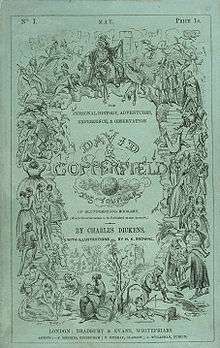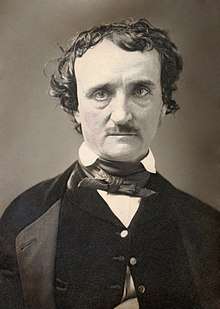1849 in literature
This article presents lists of the literary events and publications in 1849.
Whether I shall turn out to be the hero of my own life, or whether that station will be held by anybody else, these pages must show.
| |||
|---|---|---|---|
|
—Dickens, opening of David Copperfield
Events
- March–November – La Tribune des Peuples, a pan-European romantic nationalist periodical, is published by Adam Mickiewicz.
- April 22 – Fyodor Dostoyevsky and fellow members of the literary Petrashevsky Circle in Russia are arrested for expressing their progressive views. Sentenced to death on November 16 and facing a firing squad on December 23, he and some others are reprieved at the last moment and exiled to the katorga prison camps in Siberia.

1st serial ed. cover
- May 1 – Charles Dickens's Bildungsroman David Copperfield begins serial publication by Bradbury and Evans in London.
- May 10 – The Astor Place Riot takes place in Manhattan over a dispute between two Shakespearean actors, the American Edwin Forrest and the Englishman William Macready. Over 20 people are killed.
- May 28 – Anne Brontë dies of tuberculosis aged 29 at Scarborough on the Yorkshire coast of England, where she is buried. Until 2013, her headstone mistakenly gave her age as 28.[1]
- September 20 – Honoré de Balzac travels to Poland to meet Eveline Hanska, whom he will marry shortly before his death next year.
- October 3 – Edgar Allan Poe is found on the streets of Baltimore delirious, "in great distress, and... in need of immediate assistance".[2] He dies on October 7 aged 40, of an uncertain cause.
- October–December – Thomas De Quincey's essay The English Mail-Coach appears in issues of Blackwood's Edinburgh Magazine.
- November – The English scholarly correspondence magazine Notes and Queries is first published.
- November 14 – A public festival is held in Denmark to mark the 70th birthday of Adam Gottlob Oehlenschläger.
Uncertain dates
- J. A. Froude's semi-autobiographical, epistolary philosophical novel of religious doubt The Nemesis of Faith is published by John Chapman in London. A copy is burned by William Sewell, Dean of Exeter College, Oxford, himself a novelist.[3][4][5][6]
- The Leipzig publisher B. G. Teubner begins publishing the Bibliotheca Teubneriana series of editions of the Classics.
- Who's Who is published for the first time in the United Kingdom.
- Philip Massinger's play Believe as You List receives its first publication, 218 years after its theatrical première.
New books
Fiction
- William Harrison Ainsworth – The Lancashire Witches
- Charlotte Brontë (as Currer Bell) – Shirley
- François-René de Chateaubriand – Memoirs from Beyond the Grave
- Charles Dickens – David Copperfield (begins serialization)
- Fyodor Dostoevsky – Netochka Nezvanova
- Alexandre Dumas, père – The Queen's Necklace
- Paul Féval – Les Belles-de-nuit ou Les Anges de la famille
- J. A. Froude – The Nemesis of Faith
- Catherine Gore – The Diamond and the Pearl
- Charles Kingsley – Alton Locke
- Herman Melville
- Mayne Reid – The Rifle Rangers
- G. W. M. Reynolds – The Bronze Statue
- George Sand – La Petite Fadette (Little Fadette)
- Theodor Storm – Immensee
Children and young people
- Charlotte Mary Yonge – The Railroad Children
Drama
- Christian Friedrich Hebbel – Der Rubin
- Gaspar Núñez de Arce – Amor y Orgullo
- Eugène Scribe and Ernest Legouvé – Adrienne Lecouvreur
Poetry
- Matthew Arnold – The Strayed Reveller
- Petrus Augustus de Genestet – De Sint-Nicolaasavond (Saint Nicholas's Eve)
- Elias Lönnrot (compiler) – Kalevala (new version)
- Edgar Allan Poe – "Annabel Lee", "Eldorado", "The Bells", "A Dream Within a Dream"
Non-fiction
- John Mitchell Kemble – History of the Saxons in England
- Søren Kierkegaard (as Anti-Climacus) – The Sickness Unto Death (Sygdommen til Døden)
- Francis Parkman – The Oregon Trail
- Thomas Phillips – Wales, the Language, Social Condition, Moral Character, and Religious Opinions of the People, considered in their relation to Education...
- John Ruskin – The Seven Lamps of Architecture
- William Smith – Dictionary of Greek and Roman Biography and Mythology
- Henry David Thoreau – Resistance to Civil Government
- George Ticknor – A History of Spanish Literature
- Chandos Wren-Hoskyns – A Short Inquiry into the History of Agriculture in Mediæval and Modern Times
Births
- January 9 – Laura Kieler (née Petersen), Norwegian novelist and dramatic inspiration (died 1932)
- January 22 – August Strindberg, Swedish dramatist (died 1912)
- February 18 – Alexander Kielland, Norwegian novelist (died 1906)
- February 27 – Václav Beneš Třebízský, Czech novelist (died 1884)
- June 9 – Karl Tanera, German military writer and novelist (died 1904)
- July 22 – Emma Lazarus, American poet (died 1887)
- August 8 – Hume Nisbet, Scottish thriller writer, poet and artist (died 1923)
- August 9 – Amy Catherine Walton (née Deck, writing as Mrs. O. F. Walton), English writer of Christian children's books (died 1939)
- August 23 – W. E. Henley, English poet (died 1903)
- August 30 – J. M. Dent, English publisher (died 1926)
- September 3 – Sarah Orne Jewett, American writer (died 1909)
- October 7 – James Whitcomb Riley, American writer and poet (died 1916)
- November 24 – Frances Hodgson Burnett, English children's writer and playwright (died 1924)
Deaths

Daguerreotype of Edgar Allan Poe probably taken June 1849 in Lowell, Mass., a few months before his death
- January 6 – Hartley Coleridge, English poet and critic (alcohol-related, born 1796)[7]
- February 8 – France Prešeren, Slovenian poet (liver disease, born 1800)
- February 19 – Bernard Barton, English Quaker poet (born 1784)
- May 22 – Maria Edgeworth, Anglo-Irish novelist (born 1768)
- May 28 – Anne Brontë, English novelist and poet (tuberculosis, born 1820)[8]
- June 4 – Marguerite Gardiner, Countess of Blessington, Irish novelist and literary hostess (born 1789)
- July 7 – Goffredo Mameli, Italian poet (infection from bayonet wound, born 1827)
- July 12 – Horace (Horatio) Smith, English poet and novelist (born 1799)[9]
- July 25 – James Kenney, English dramatist (born 1780)
- July 27 – Charlotte von Ahlefeld, German novelist (born 1781)
- July 31 – Sándor Petőfi, Hungarian poet and revolutionary (probably killed in Battle of Segesvár, born 1823)
- August 25 – Adele Schopenhauer, German novelist and paper-cut artist (born 1797)
- October 7 – Edgar Allan Poe, American poet, short story writer and critic (born 1809)
gollark: So now I'm just sitting here waiting for `pg_dumpall` to run.
gollark: `pg_upgrade` is simple enough, but I still have to reinitialize the entire data directory every major version, and it *didn't work* because it refuses to migrate the encoding of my data.
gollark: Also, PostgreSQL is an UTTER rhombic triacontahedron because it makes updates so irritatingly hard.
gollark: Wow, bee that extremely.
gollark: APIONET #a.
References
- The new stone. Retrieved 7 June 2020.
- According to the man who found him, Joseph W. Walker.Quinn, Arthur Hobson (1998). Edgar Allan Poe: A Critical Biography. Baltimore: Johns Hopkins University Press. p. 638. ISBN 978-0-8018-5730-0. (Originally published in 1941 by New York: Appleton-Century-Crofts, Inc.)
- Paul, Herbert (1906). The Life of Froude. New York: Charles Scribner's Sons. pp. 47–48.
- Sutherland, John (1988). The Longman Companion to Victorian Fiction. London.
- Willey, Basil (1956). "J. A. Froude". More Nineteenth Century Studies: a Group of Honest Doubters. London: Chatto & Windus. p. 131.
- Ashton, Rosemary (1989). "Doubting Clerics: From James Anthony Froude to Robert Elsmere via George Eliot". In Jasper & Wright (ed.). The Critical Spirit and the Will to Believe. New York: St. Martins. p. 76.
- Derwent Coleridge, memoir, 1851.
- "Anne Brontë | British author". Encyclopedia Britannica. Retrieved 8 April 2019.
- "Horace Smith | English writer". Encyclopedia Britannica. Retrieved 8 April 2019.
This article is issued from Wikipedia. The text is licensed under Creative Commons - Attribution - Sharealike. Additional terms may apply for the media files.